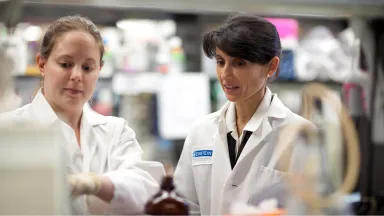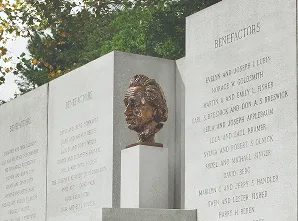
Simon D. Spivack, M.D., M.P.H.
- Professor, Department of Medicine (Pulmonary Medicine)
- Professor, Department of Epidemiology & Population Health (Epidemiology)
- Professor, Department of Genetics
- Chief Emeritus, Division of Pulmonary Medicine, Department of Medicine
Area of research
- Development of early lung cancer detection strategies; exhaled nucleic acid and other airway biomarkers. , Genome-wide surveys of lung epithelia. Translational lung studies. Mechanistic studies in functional epigenetics.
Location
- Albert Einstein College of Medicine Michael F. Price Center 1301 Morris Park Avenue 301 Bronx, NY 10461
Research Profiles
Professional Interests
Focusing diagnostics and therapeutics on those most likely to benefit is a key to successful intervention at both the public health and clinical levels. The translational goal of the Spivack laboratory is to identify individuals at particularly high risk for lung malignancy, and selected non-malignant lung diseases, upon whom to focus smoking/toxin exposure cessation (primary prevention), chemoprevention (secondary prevention), and early disease detection efforts (disease screening, tertiary prevention).
The laboratory is currently exploring individual Gene x Environment signatures as susceptibility markers by exploring quantitative gene (mRNA) expression phenotypes, and the DNA sequence, methylation, microRNA, and other epigenetic features potentially underlying these expression phenotypes, in vitro and in human populations. This is performed in the setting of defined tobacco, diet, and other exposures. There are both mechanistic and translational components to the studies.
Mechanistically, the role of epigenetic variation in promoter regions in the 5' and 3' regulatory regions of carcinogenesis and oxidant pathway genes is being explored in vitro, using human genomic DNA reporter constructs, and native gene regulation models. High resolution technologies include the realtime quantitation of native mRNA and microRNA by the laboratory's RNA-specific strategy (patented); the tagged-bisulfite genomic sequencing strategy to determine single base resolution CpG methylation status (tBGS, patented); an experimental strategy for assaying microRNA binding to mRNA, for determining the role of miRNA in candidate gene regulation (patented); and evaluation of functional consequences of DNA methylation detail, using a novel patch reporter construct (patented). A new method to engineer methyl-cytosines into the epigenome has recently been developed.
Whole (epi)genome approaches to identify molecular events unique to lung cancer are being completed, which will represent one of the initial cross-platform 'omics level discovery examinations of lung tissues. The execution of each individual discovery platform involves expert local collaborators and cores in (epi)genetics and genomics, and the "integromics" is critically reliant on Einstein strengths in informatics and biostatistical analyses.
Translationally, human lung carcinogenesis biomarkers are being established by pairing laser capture microdissected lung with several unique, non-invasively collected surrogate specimens developed in the laboratory. These include mRNA expression signatures from brush-exfoliated buccal mucosa cells, microRNAs detected in exhaled breath condensate representing first reports for a new exhaled airway biomarker class, and exhaled metabolomic signatures. These airway-derived specimens continue to accrue from a sampling (currently n>1000) of a population assembled in a lung cancer case-control context. The specimens are being studied with a view toward developing non-invasive assays in populations.
The overall aim is to develop informative non-invasive risk profiling, preventive, and early disease detection strategies for the lung in human populations.
Work is funded by ongoing NIH, DoD, and Foundation support.
Clinical Specialties
- lung nodule evaluation
- lung cancer diagnostics and screening
- interstitial lung disease
- environmental lung disease
- refractory asthma
- general pulmonary medicine
Selected Publications
- Zhenqiu Huang, Alex Maslov, Xiao Dong, Shixiang Sun, Moonsook Lee, Chirag Shah, Ali Sadoughi, Aditi Desai, Dhruv Patel, Taha Siddiqui, Jaiminkumar Patel, Miao Shi, Spencer Waldman, Ava Marsh, Yakov Peter, *Simon D Spivack, *Jan Vijg. Somatic Mutations At Single Base Resolution in Single Bronchial Progenitor Cells Collected From Human Lung. (Nature Genetics, April 2022, https://www.nature.com/articles/s41588-022-01035-w). (*co-senior authors).
- Shi M, Han W, Loudig O, Shah CD, Dobkin JB, Keller S, Sadoughi A, Zhu C, Siegel RE, Fernandez MK, DeLaRosa L, Patel D, Desai A, Siddiqui T, Gombar S, Suh Y, Wang T, Hosgood HD, Pradhan K, Ye K, Spivack SD. Initial development and testing of an exhaled microRNA detection strategy for lung cancer case-control discrimination. Sci Rep. 2023 Apr 24;13(1):6620. doi: 10.1038/s41598-023-33698-8. PMID: 37095155; PMCID: PMC10126132.
- Yoo EJ, Kim JS, Stransky S, Spivack S, Sidoli S. Advances in proteomics methods for the analysis of exhaled breath condensate. Mass Spectrom Rev. 2024 Jul-Aug;43(4):713-722. doi: 10.1002/mas.21871. Epub 2023 Dec 27. PMID: 38149478.
- Zefi O, Waldman S, Marsh A, Shi MK, Sonbolian Y, Khulan B, Siddiqui T, Desai A, Patel D, Okorozo A, Khader S, Dobkin J, Sadoughi A, Shah C, *Spivack S, *Peter Y. Distinctive field effects of smoking and lung cancer case-control status on bronchial basal cell growth and signaling. Respir Res. 2024 Aug 19;25(1):317. doi: 10.1186/s12931-024-02924-w. PMID: 39160511; PMCID: PMC11334309. *(co-senior authors)
- Mitchell MI, Ben-Dov IZ, Ye K, Liu C, Shi M, Sadoughi A, Shah C, Siddiqui T, Okorozo A, Gutierrez M, Unawane R, Biamonte L, Parikh K, Spivack S, Loudig O. Exhaled breath condensate contains extracellular vesicles (EVs) that carry miRNA cargos of lung tissue origin that can be selectively purified and analyzed. J Extracell Vesicles. 2024 Apr;13(4):e12440. doi: 10.1002/jev2.12440. Erratum in: J Extracell Vesicles. 2024 May;13(5):e12453. doi: 10.1002/jev2.12453. PMID: 38659349; PMCID: PMC11043690.
- Khulan B, Ye K, Shi MK, Waldman S, Marsh A, Siddiqui T, Okorozo A, Desai A, Patel D, Dobkin J, Sadoughi A, Shah C, Gera S, Peter Y, Liao W, *Vijg J, *Spivack SD. Normal bronchial field basal cells show persistent methylome-wide impact of tobacco smoking, including in known cancer genes. Epigenetics. 2025 Dec;20(1):2466382. doi: 10.1080/15592294.2025.2466382. Epub 2025 Feb 20. PMID: 39980243; PMCID: PMC11849931. *(co-senior authors)






